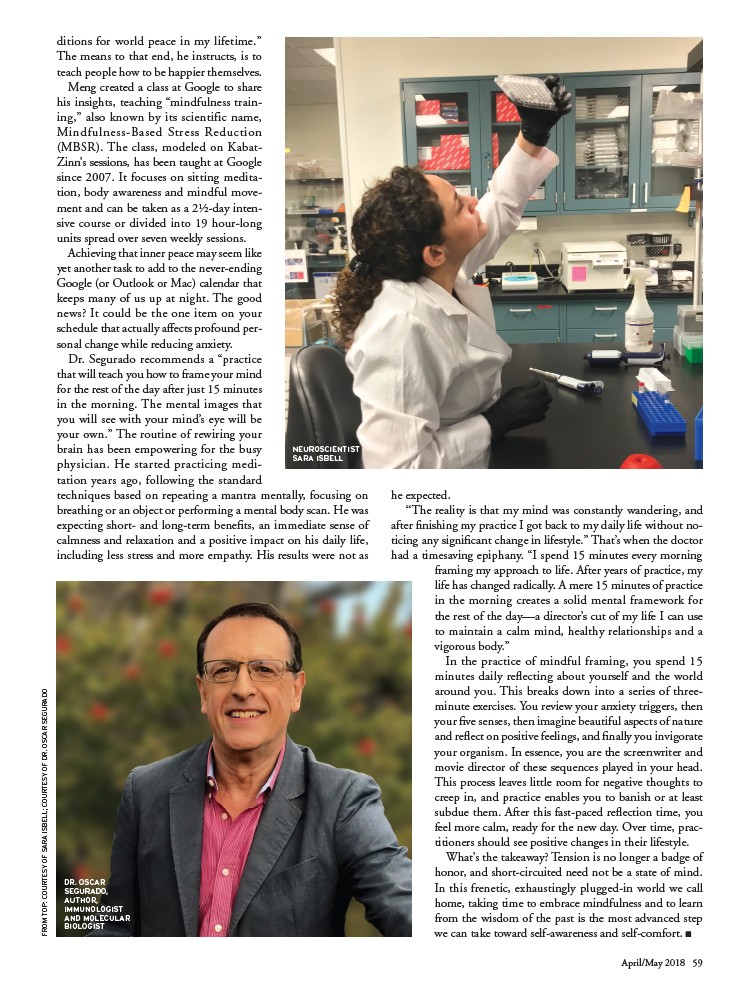
April/May 2018 59
FROM TOP: COURTESY OF SARA ISBELL; COURTESY OF DR. OSCAR SEGURADO
ditions for world peace in my lifetime.”
The means to that end, he instructs, is to
teach people how to be happier themselves.
Meng created a class at Google to share
his insights, teaching “mindfulness training,”
also known by its scientific name,
Mindfulness-Based Stress Reduction
(MBSR). The class, modeled on Kabat-
Zinn’s sessions, has been taught at Google
since 2007. It focuses on sitting meditation,
body awareness and mindful movement
and can be taken as a 2½-day intensive
course or divided into 19 hour-long
units spread over seven weekly sessions.
Achieving that inner peace may seem like
yet another task to add to the never-ending
Google (or Outlook or Mac) calendar that
keeps many of us up at night. The good
news? It could be the one item on your
schedule that actually affects profound personal
change while reducing anxiety.
Dr. Segurado recommends a “practice
that will teach you how to frame your mind
for the rest of the day after just 15 minutes
in the morning. The mental images that
you will see with your mind’s eye will be
your own.” The routine of rewiring your
brain has been empowering for the busy
physician. He started practicing meditation
years ago, following the standard
techniques based on repeating a mantra mentally, focusing on
breathing or an object or performing a mental body scan. He was
expecting short- and long-term benefits, an immediate sense of
calmness and relaxation and a positive impact on his daily life,
including less stress and more empathy. His results were not as
he expected.
“The reality is that my mind was constantly wandering, and
after finishing my practice I got back to my daily life without noticing
any significant change in lifestyle.” That’s when the doctor
had a timesaving epiphany. “I spend 15 minutes every morning
framing my approach to life. After years of practice, my
life has changed radically. A mere 15 minutes of practice
in the morning creates a solid mental framework for
the rest of the day—a director’s cut of my life I can use
to maintain a calm mind, healthy relationships and a
vigorous body.”
In the practice of mindful framing, you spend 15
minutes daily reflecting about yourself and the world
around you. This breaks down into a series of threeminute
exercises. You review your anxiety triggers, then
your five senses, then imagine beautiful aspects of nature
and reflect on positive feelings, and finally you invigorate
your organism. In essence, you are the screenwriter and
movie director of these sequences played in your head.
This process leaves little room for negative thoughts to
creep in, and practice enables you to banish or at least
subdue them. After this fast-paced reflection time, you
feel more calm, ready for the new day. Over time, practitioners
should see positive changes in their lifestyle.
What’s the takeaway? Tension is no longer a badge of
honor, and short-circuited need not be a state of mind.
In this frenetic, exhaustingly plugged-in world we call
home, taking time to embrace mindfulness and to learn
from the wisdom of the past is the most advanced step
we can take toward self-awareness and self-comfort. n
NEUROSCIENTIST
SARA ISBELL
DR. OSCAR
SEGURAD0,
AUTHOR,
IMMUNOLOGIST
AND MOLECULAR
BIOLOGIST